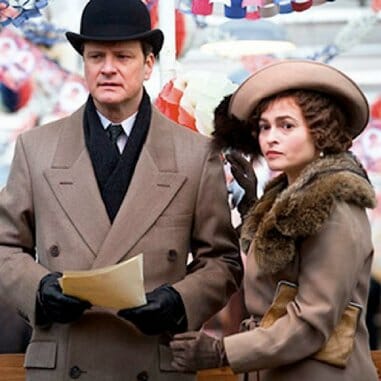
Director: Tom Hooper
Writer: Iain Canning
Cinematographer: Danny Cohen
Stars: Colin Firth, Geoffrey Rush, Helena Bonham Carter, Michael Gambon, Guy Pearce
Acting is a funny thing to judge. Often, the performances we most admire are those where actors stretch themselves the furthest by taking on roles with handicaps. Dustin Hoffman’s autism in Rain Man, Daniel Day-Lewis’ cerebral palsy in My Left Foot, Sean Penn’s mental disability in I Am Sam and Jon Voight’s physical disability in Coming Home all led to critical acclaim. They were all wonderful performances, but their quality was highlighted by the obvious ways each actor had to reach outside his own experience. And in The King’s Speech, the same can certainly be said for Colin Firth.
Portraying the stuttering Prince Albert, who would become King George VI of Britain, Firth maintains a constant aura of frustration. It’s not the way that a non-stuttering actor stutters that makes him believable, but the pitch-perfect emotional resonance of gifted actor. And while the performances of his co-stars—Helena Bonham Carter as Queen Elizabeth and Geoffrey Rush as the king’s Australian speech therapist Lionel Logue—aren’t highlighted by such an obvious physical obstacle, they’re both subtly brilliant.
It’s the interplay between all three actors—and the brief scenes with Michael Gambon as King George V—that make Tom Hooper’s film such a joy to watch, despite a climax that is little more than a man trying to read several paragraphs over the radio. Indeed there are few surprises in the film—as Albert leaves Logue’s office for the first time promising never to return, the audience can guess what happens with the vinyl record he’s refused to listen to. And the history of the royal ascendancy and England’s march towards war with Germany are hard spoilers to avoid.
But the relationship between a commoner teacher and regal student provides for enough drama, and the obstacle overcome is both inspiring and unique. Albert is born into privilege, but also into duty which requires public speaking, the irony of which haunts him constantly. And the importance of being able to provide a strong, inspiring voice to his people only grows with the threat of war. We care so much for his character by the end of the film, that the final speech is indeed a worthy last hurdle to clear.